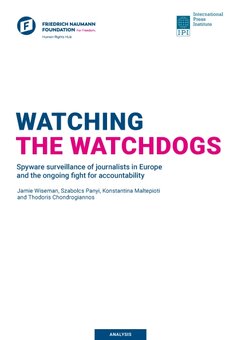Raif Badawi Talk 2024
Digital.Press.Freedom.

Scott Griffen (IPI), Ensaf Haidar (Wife of Raif Badawi), Hanene Zbiss (Investigative journalist from Tunisia), Tamina Kutscher (Moderator, Russia expert, journalist), Irina Borogan (Russian exile journalist and author), Andrei Soldatov (Russian exile journalist and author) and Margit Ketterle (BOEV).
© FNFThe Raif Badawi Talk 2024, held on October 19 at the Frankfurt Book Fair, was traditionally organized in cooperation with the German Publishers and Booksellers Association and Stiftung Freedom of Expression. The event was held under the title „Digital.Press.Freedom“ and explored the growing challenges to free and independent journalism, focussing on the delicate balance between legitimate and necessary intervention and the authoritarian misuse of power to suppress free speech. Liberal societies, the panelists agreed, must become more aware of their role as global role models in defending press freedom.
Ensaf Haidar, wife of Raif Badawi, highlighted the ongoing challenges her family faces, despite Raif’s formal release from prison. She shared that while the initial struggle was focused on waiting for his release, the situation has become more difficult now that Raif is technically free but unable to leave the country for another eight years. Haidar emphasized that many around the world mistakenly believe Raif’s ordeal is over, simply because he is no longer incarcerated. She stressed the importance of keeping his case in the public eye, with the Friedrich Naumann Foundation for Freedom continuing to remind the world that Raif's punishment for his brave stance on free speech is far from over.

Irina Borogan, Hanene Zbiss, Scott Griffen und Tamina Kutscher.
© FNFScott Griffen of the International Press Institute (IPI) addressed the issue of spyware and digital threats to journalism, underscoring how tools like Pegasus and Predator are not just the domain of authoritarian regimes but were also used by governments in Europe. Spyware poses a particularly dangerous threat to journalism, as it often goes undetected and undermines the fundamental principles of journalistic work. It jeopardizes the protection of sources, endangers journalists' safety, and ultimately seeks to silence their voices by making their work harder or even impossible.
Tunisia was another focus area of the panel, as journalist Hanene Zbiss described the deteriorating situation for press freedom in her country. She explained that since July 2021, President Kais Saied has implemented measures that severely restrict independent journalism, including a requirement to align with the government’s perspective in reporting. The introduction of Decree Law 54 in 2022, aimed at combating "false information" online, has led to concerns about potential political abuse. Zbiss noted that so far 170 individuals, including journalists, activists and politicians, have been imprisoned under this law. She also expressed concern about a targeted campaign against women using the new Decree, often accusing them of serving foreign interests. A new reform is currently under way, seeking to rule out the influence of foreign interest and so-called "foreign agents."
The conversation then turned to Russia, with Irina Borogan shedding light on the country’s long-standing surveillance of its citizens, both physically and digitally. Since the invasion of Ukraine in 2022, global attention on Russia’s suppression of press freedom has increased, but Borogan reminded the audience that these practices have been in place for years. She and her partner, Andrei Soldatov, now live under police protection in London, yet remain vulnerable to the Kremlin’s repressive tactics. Borogan discussed the rise of SLAPPs (Strategic Lawsuits Against Public Participation), particularly highlighting her own experience. Their book The Compatriots was temporarily banned in Germany following a legal complaint by a Russian businessman. This case can serve as an example to illustrate the growing use of SLAPPs to intimidate and silence journalists and authors critical of Russian politics and security services by legal means. But these cases also serve to scare publishers off from working with investigative journalists wanting to publish ciritical texts.
Despite the gravity of the threats discussed, the panelists also offered thoughts on how to combat these growing, especially digital dangers to press freedom. Griffen raised a pressing question for European policy makers: how should societies manage the increasing risks posed by digital surveillance tools? He advocated for a strict ban on high-risk technologies that jeopardize fundamental rights, including press freedom. The European Media Freedom Act, as detailed in the IPI’s report Watching the Watchdogs for the Friedrich Naumann Foundation, represents only a starting point in addressing these issues.
Borogan emphasized that society must play an active role in resisting tools of digital suppression and unchecked surveillance. She also highlighted the need for stronger measures to address SLAPPs, pointing out that publications can be banned (at least temporarily) before a proper hearing is held. Another issue she raised was the spread of disinformation, which thrives in environments where trust in media and government is weak. To counter disinformation, Borogan suggested that the public must be better informed about what is happening by official sources as well as independent media.
Zbiss echoed this point, adding that improving media literacy accross the board is essential to effectively combat disinformation. While regulations for social media platforms are important, such as those already in place in Europe, she emphasized the need for ethical guidelines in social media use. She also called for greater solidarity and protection mechanisms for journalists and writers who are increasingly vulnerable to digital repression – also amongst each other. Raif Badawi, she reminded the audience, was himself a blogger and digital publisher, whose work made him a target of these very threats.

Gisela Piltz
© FNF
Ensaf Haidar
© FNF
Margit Ketterle
© FNF

